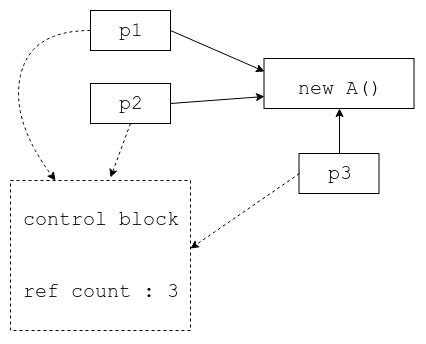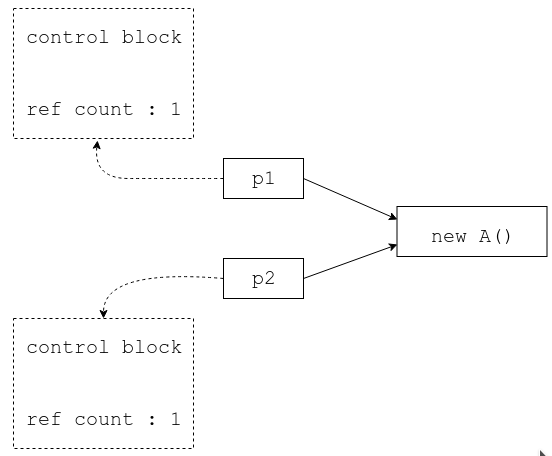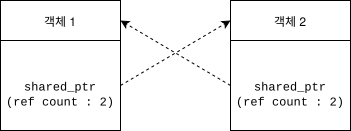
reference와 smart pointer
c/c++은 garbage collector가 존재하지 않기 때문에 소멸자를 직접 호출해야 한다.
또한 reference는 여러 변수가 소유권을 공유하므로 이중 소멸 문제가 발생하기 쉽다.
- Memory leak 등 문제 발생
#include <iostream>
class A {
int *data;
public:
A() {
data = new int[100];
std::cout << "자원을 획득함!" << std::endl;
}
~A() {
std::cout << "소멸자 호출!" << std::endl;
delete[] data;
}
};
void do_something() {
A *pa = new A();
// delet pa; // 소멸자 생략
}
int main() {
do_something(); // 자원을 획득함!
// 할당된 객체가 소멸(소멸자 호출!)되지 않음!
// 즉, 400 바이트 (4 * 100) 만큼의 메모리 누수 발생
}
- RAII(Resource Acquisition Is Initialization)
- 자원의 생애주기(life cycle)를 객체의 생애(lifetime)에 바인딩시키는 기법
- stack unwinding : 스택에 정의되어 있는 객체는 block이 끝나면 소멸자 자동 호출
- 포인터 객체로 RAII를 실현
- 변수 및 메소드 참조 등은 일반 포인터와 동일하게 작동
- 복사 및 함수 호출 구현은 다를 수 있음
- auto_ptr : 더이상 사용하지 않음
unique_pointer
단일 소유권 부여를 통해 해제된 메모리의 소멸(double free) 방지.
- 단일 소유권 -> 소유권 명확히
std::unique_ptr<type> var(new constructor)std::unique_ptr<type> var = std::make_unique<type>(params)
class A {
int a,b;
public:
A(int a, int b) : a(a), b(b) {}
...
}
std::unique_ptr<A> ptr(new A(3,5));
std::unique_ptr<A> ptr = std::make_unique<A>(3,5);
auto ptr = std::make_unique<A>(3,5);
- 복사 생성자가 deleted function로 금지
- 삭제된 함수(deleted function) :
A(cont A& a) = delete;처럼 delete를 통해 해당 함수를 금지시키는 기능.
- 삭제된 함수(deleted function) :
std::move를 통한 소유권 이전은 가능obj.get(): get 함수, 주소값 반환- 이동 완료된 pointer -> nullptr
#include <iostream>
#include <memory>
class A {
int *data;
...
};
void do_something() {
std::unique_ptr<A> pa(new A());
std::unique_ptr<A> pb = pa; // 복사 생성 금지, error
std::unique_ptr<A> pb = std::move(pa); // 가능
std::cout << pa.get() << "\n"; // 0 (nullptr)
}
int main() { do_something(); } // error
- reference를 argument 전달은 가능하나, 유일한 소유권 기능 상실
- 포인터 주소값 전달(get 함수)을 통해 기능 유지
#include <iostream>
#include <memory>
class A {
...
void do_something(A* ptr) { ptr->do_sth(3); }
int main() {
std::unique_ptr<A> pa(new A());
do_something(pa.get());
}
- unique_ptr 컨테이너
- 컨테이너의 push : 복사 생성, 따라서 unique_ptr 사용 불가
- 우측값 레퍼런스, 즉
std::move이용
#include <iostream>
#include <memory>
#include <vector>
class A {
int *data;
public:
A(int i) {
std::cout << "자원을 획득함!" << std::endl;
data = new int[100];
data[0] = i;
}
void some() { std::cout << "일반 포인터와 동일하게 사용가능!" << std::endl; }
~A() {
std::cout << "자원을 해제함!" << std::endl;
delete[] data;
}
};
int main() {
std::vector<std::unique_ptr<A>> vec;
std::unique_ptr<A> pa(new A(1));
vec.push_back(pa); // error, 겁나 김
vec.push_back(std::move(pa)); // good
}
share_pointer
소유권을 복수의 변수가 공유해야 할 때 사용.
referenc counter를 통해 소멸자 호출을 관리한다.

출처 : https://modoocode.com/252
obj.use_count(): reference counter- ref conut == 0 -> 소멸자 호출
- 제어 블록(control block) 생성, 공유
std::shared_ptr<type> var(new constructor)std::shared_ptr<type> var = std::make_shared<type>(params): 동적 바인딩 최소화- shared_ptr는 동적 할당이 2번 발생(변수, 제어 블록 생성)
- std::make_shared - 동적 바인딩 1회
class A {
int a,b;
public:
A(int a, int b) : a(a), b(b) {}
...
}
std::shared_ptr<A> ptr(new A(3,5));
auto ptr = std::make_share<A>(3,5)
std::shared_ptr<A> p1(new A());
std::shared_ptr<A> p2(p1); // p2 역시 생성된 객체 A 를 가리킨다.
std::cout << p1.use_count(); // 2
std::cout << p2.use_count(); // 2
shared_ptr 주의점
- std::shared_ptr 인자는 shared_ptr로 받아야 제어 블록이 공유됨
- 일반 객체의 주소값을 받는 경우 : 새로운 제어 블록 생성

출처 : https://modoocode.com/252
#include <iostream>
#include <memory>
class A {
int* data;
public:
A() {
data = new int[100];
std::cout << "자원을 획득함!" << std::endl;
}
~A() {
std::cout << "소멸자 호출!" << std::endl;
delete[] data;
}
};
int main() {
A* a = new A();
std::shared_ptr<A> pa1(a);
std::shared_ptr<A> pa2(a); // error, 새로운 제어 블록 생성, double free
std::shared_ptr<A> pa2(pa1); // ok, pa1는 shared_ptr이므로 제어 블록 공유
std::cout << pa1.use_count() << std::endl;
std::cout << pa2.use_count() << std::endl;
}
std::enable_shared_from_this<class>- 객체 내부에서 자기 자신을 가리키는 경우 : this, 즉 주소값을 참조해야 함
- 이 기능을 가능하게 해주는 객체, 필요한 class에 상속
shared_from_this():std::enable_shared_from_this<class>의 메소드- std::shared_ptr<class>(this); 기능, 즉 자기 자신의 shared_ptr(return에 사용)
- instance는 shared_ptr 객체여야 작동
#include <iostream>
#include <memory>
class A : public std::enable_shared_from_this<A> {
int *data;
public:
A() {
data = new int[100];
std::cout << "자원을 획득함!" << std::endl;
}
~A() {
std::cout << "소멸자 호출!" << std::endl;
delete[] data;
}
std::shared_ptr<A> get_shared_ptr() { return shared_from_this(); }
};
int main() {
A* pa1 = new A(); // error, std::shared_ptr type이 아님
std::shared_ptr<A> pa1 = std::make_shared<A>();
std::shared_ptr<A> pa2 = pa1->get_shared_ptr();
std::cout << pa1.use_count() << std::endl;
std::cout << pa2.use_count() << std::endl;
}
weak_pointer
서로 다른 2개의 shared_ptr가 서로를 가르키고 있으면(순환 참조) 객체의 소멸 불가능하다.
이 문제를 해결하기 위해 weak_ptr를 사용한다.

출처 : https://modoocode.com/252
#include <iostream>
#include <memory>
class A {
int *data;
std::shared_ptr<A> other;
public:
A() {
data = new int[100];
std::cout << "자원을 획득함!" << std::endl;
}
~A() {
std::cout << "소멸자 호출!" << std::endl;
delete[] data;
}
void set_other(std::shared_ptr<A> o) { other = o; }
};
int main() {
std::shared_ptr<A> pa = std::make_shared<A>();
std::shared_ptr<A> pb = std::make_shared<A>();
pa->set_other(pb);
pb->set_other(pa);
}
>>>
자원을 획득함!
자원을 획득함! // 소멸자 호출x
- shared_ptr와 다르게 참조 개수를 늘리지 않음
- weak_ptr -> shared_ptr 이지만 반대는 성립하지 않을 때, shared_ptr 객체는 소멸(\(\because\) ref count == 0)
- 제어 블록을 생성하지 않으므로 가르키는 대상이 shared_ptr여야 함
- 또한 shared_ptr로 변환 과정 필요
std::weak_ptr<T>::lock- ref count == 0 : return 0
#include <iostream>
#include <memory>
#include <string>
#include <vector>
class A {
std::string s;
std::weak_ptr<A> other;
public:
A(const std::string& s) : s(s) { std::cout << "자원을 획득함!" << std::endl; }
~A() { std::cout << "소멸자 호출!" << std::endl; }
void set_other(std::weak_ptr<A> o) { other = o; }
void access_other() {
std::shared_ptr<A> o = other.lock();
if (o) {
std::cout << "접근 : " << o->name() << std::endl;
} else {
std::cout << "이미 소멸됨 ㅠ" << std::endl;
}
}
std::string name() { return s; }
};
int main() {
std::vector<std::shared_ptr<A>> vec;
vec.push_back(std::make_shared<A>("자원 1"));
vec.push_back(std::make_shared<A>("자원 2"));
vec[0]->set_other(vec[1]);
vec[1]->set_other(vec[0]);
// pa 와 pb 의 ref count 는 그대로다.
std::cout << "vec[0] ref count : " << vec[0].use_count() << std::endl;
std::cout << "vec[1] ref count : " << vec[1].use_count() << std::endl;
// weak_ptr 로 해당 객체 접근하기
vec[0]->access_other();
// 벡터 마지막 원소 제거 (vec[1] 소멸)
vec.pop_back();
vec[0]->access_other(); // 접근 실패!
}
>>>
자원을 획득함!
자원을 획득함!
vec[0] ref count : 1
vec[1] ref count : 1
접근 : 자원 2
소멸자 호출!
이미 소멸됨 ㅠ
소멸자 호출!
C
Contents

